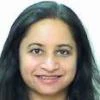Many people don’t think twice when they’re asked to show their ID while opening a bank account or even while waiting in long lines to get a driver's license. Yet for the 1.5 billion people around the world who don’t have a form of identification, this is the first barrier they face completing these basic – but important – tasks.
Harnessing the potential of technology to overcome the challenges of providing unique identification to people across the developing world was the topic of an Annual Meetings seminar on ‘Identification for Development.’ The panel was moderated by the new World Bank Chief Economist Paul Romer, and featured Sri Mulyani Indrawati, Minister of Finance of Indonesia; Ajay Pandey, CEO of the Unique Identification Authority of India; Justin Forsyth, Deputy Executive Director of UNICEF; Tara Nathan, Executive Vice President of Public-Private Partnerships at MasterCard; and John Giusti, Chief Regulatory Officer at the GSMA, an association of 800 mobile operators.
In most countries around the world, proving your identity is a first and crucial step in being able to receive development solutions such as health care, education and other benefits from the government set aside for the poorest citizens. These same citizens are also the ones who don’t have access to an ID system or the documents needed to get an ID. This is why the World Bank Group initiated Identification for Development (ID4D) as a cross-sectoral program as many countries lack robust and inclusive identification systems. This is linked to achieving at least 10 of the SDGs and the SDG target of legal identity for all by 2030.
According to UNICEF, 45% of the world’s children do not even have a birth registration; most of them are in Sub-Saharan Africa and South Asia. “If children aren’t counted, they are invisible,” said Justin Forsyth of UNICEF. “Birth registrations are one of the most important tools to make sure children are not left behind.” He explained how it was crucial for children to get access to basic health care or education, prevent child labor or trafficking and especially important for migrant or refugee children to receive opportunities.
The panelists from India and Indonesia both discussed their countries’ attempts to address these very challenges. The Indian Government launched Aadhaar in 2010, an ambitious project to uniquely identify every resident of India. More than a billion people have been registered so far and more than 5 million are using their fingerprints to access services each day. Government programs are now able to verify someone’s unique identity and better target social assistance. For example, the costs recovered by reducing waste in one program allowed the Government to recover – in just one year – the entire cost of rolling out Aadhaar.
Similarly, integrating several Government databases and systems into a single national identification number (Nomor Induk Kependudukan, or NIK) has enabled the Government of Indonesia to save millions of dollars by reducing duplication. It has also helped the Government to keep an updated database of the poorest 40% of its citizens, which is used to manage direct cash transfer programs.
The panel shared examples and discussed the role that technology and the private sector can play in providing identification to everyone, with a particular focus on mobile networks considering the high penetration of mobile phones in developing countries. “Mobile services are often the only access point for many people, especially for refugees and migrants,” said John Guisti of GSMA.
In addition, the panel examined the importance of privacy and data protection and having legal and technical safeguards in place when biometric data is being shared and re-used by public or commercial service providers. Moving forward, the panel emphasized that political commitment and linking identification with service delivery were critical for the success of identification systems in developing countries.
Today technological advances have created unprecedented protection to provide identification to all. Let’s make everyone count.


Join the Conversation